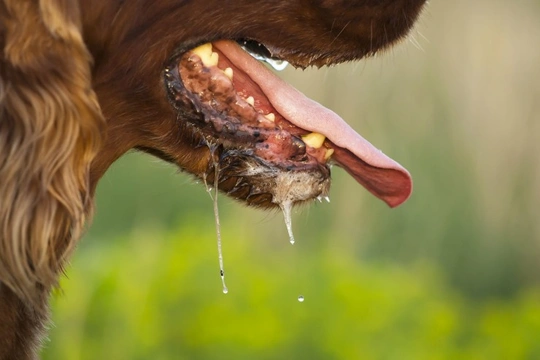
6 weird facts about dog saliva you might not know
Some dogs are incredibly slobbery and drool most of the time, while others are better at keeping their saliva inside their mouths, making them tidier companions. All dogs produce saliva — between 500ml and a litre daily for a medium-sized dog breed — and even more if they eat only dry food which requires extra moisture for digestion.
While dog saliva carries bacteria and dirt, meaning it's important not to let your dog lick your face and to wash your hands afterwards, saliva itself plays many useful roles in a dog’s biology. This article explores six fascinating and sometimes surprising things your dog's saliva can do.
1. Saliva is essential for digestion
Dogs have two saliva glands inside their mouths that produce all that slobber. Saliva keeps the mouth moist and begins the digestive process. When dogs smell food or feel hungry, their saliva glands release moisture containing digestive enzymes that start breaking down food before it reaches the stomach. This is especially important for dogs eating dry kibble, as saliva moistens and softens the food for easier chewing and swallowing.
2. Saliva enhances scent detection
Dogs rely heavily on their sense of smell, and saliva assists this process. They often lick their noses to keep them moist, helping scent particles cling better. Licking can also transfer scent particles into the mouth, where the Vomeronasal organ (or Jacobson’s organ) — a secondary scent organ located on the roof of the mouth — enhances olfactory detection. This remarkable system makes dog saliva a vital part of their scenting ability.
3. Saliva helps dogs stay cool
Unlike humans, dogs do not sweat much through their skin and mainly cool themselves by panting. The saliva in their mouths aids cooling by evaporation. When cooler air flows through the moist mouth, saliva evaporates, helping to lower their core body temperature. This is why dogs often drool and pant on hot days — their saliva is working hard to regulate heat.
4. Saliva may aid wound healing but with caution
Dogs instinctively lick wounds to clean and soothe them, aided by some natural antibacterial proteins in their saliva. This behaviour can help remove dirt and bacteria and promote healing to some degree. However, saliva also contains many potentially harmful bacteria, so excessive licking can delay healing or cause infections. That's why vets often recommend buster collars after surgery to prevent dogs licking wounds excessively.
5. But saliva can also hinder healing
Despite some antibacterial properties, dog saliva harbours diverse bacteria due to their grooming habits. Introducing saliva to surgery wounds or deep injuries can lead to serious infections. It's crucial to prevent dogs from licking healing wounds, as humans often do not handle dog saliva hygienically, and saliva from other dogs living in different environments can be particularly risky.
6. Excessive saliva can be a sign of nausea
Dogs sometimes drool or salivate excessively before vomiting. This saliva helps neutralise stomach acid and bile that come up, protecting the lining of their mouth and throat from damage. If your dog suddenly produces more saliva than usual, it may be wise to stand clear and watch for other signs of illness, or consult your vet if concerned.
Understanding these facts about dog saliva helps you better appreciate your pet’s biology and behaviour. Remember, good hygiene around your dog’s saliva is important for your health, and always monitor any abnormal drooling as it may signal health concerns needing veterinary advice.



